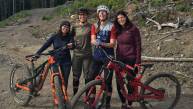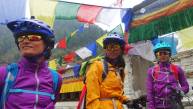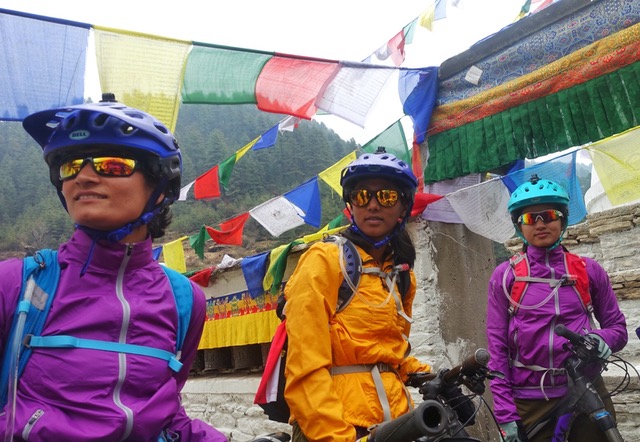 This week in Women in the Mountains, we sat down with Julie Cornelius of World Ride. World Ride is 501(c)3 non profit that works to empower women globally through mountain biking. World Ride photo.
This week in Women in the Mountains, we sat down with Julie Cornelius of World Ride. World Ride is 501(c)3 non profit that works to empower women globally through mountain biking. World Ride photo.
Until that moment, Aarati Shrestha had never touched a mountain bike before. She was just one of many Nepali women attending a mountain bike skills clinic hosted by the non-profit World Ride, aiming to empower women all over the world with mountain biking. Julie Cornelius spearheaded the organization, and was now teaching this eager group of beginner Nepali riders alongside Coach Lindsey Richter of Ladies AllRide. The two coaches grabbed either side of the bike so the new rider wouldn’t fall. With their guidance, Shrestha made a few tentative pedal strokes around the flat clearing. Despite traditional cultural beliefs that Nepali women should be busy in domestic roles, this group of women remained stubborn. They wanted to learn how to ride, and this seemed like the perfect opportunity to try. After one teaching session, they were hooked and kept riding together weekly—Shrestha joined too.
RELATED: Support World Ride’s Goal to Get More Women on Mountain Bikes
Seven months later, Cornelius returned to Nepal to meet up with the same group of gals with hopes of expanding their technical riding skills. When she brought them to an intimidating section of the trail, the group confidently rode everything without stopping. Shrestha, who once struggled with keeping her balance while pedaling simple circles, sent it over a drop with no questions asked. Now, Shrestha regularly competes in the Nepali Downhill Championships, even placing third last year. This kind of transformation is pretty common for Cornelius to see. Sometimes her work with World Ride is just about giving women like Shrestha the confidence they didn’t know they had. Other days, it’s providing female mountain bikers in Nepal and Guatemala the tools to become professional guides. No matter the outcome, Cornelius is always blown away by the incredible work bikes can do for communities all over the world. Since launching World Ride in 2018, Cornelius has expanded their mission from Nepal to Guatemala, Peru, and Lesotho. Her hope is to get more women on bikes, racing, and guiding trips all throughout the world by supporting leadership and guide training, and organizing mountain bike trips to the locations that the non profit operates in.
We caught up with Cornelius to hear more about how World Ride came to be, and the ways we can get involved with the organization. Right now, the easiest way to support their mission is to join their virtual movie night fundraiser tomorrow at 7:00 p.m. Tickets are only $10, and all the money goes to supporting the female mountain bike guides. See below for more information.
Films: Pedal, Velosolutions Pump for Peace Lesotho, Forward with Casey Brown, Trails Alive, and Choosing to Live.
Live Q&A with Claudio Caluori, Jeff Bartlett and Sarah Hornby.
RSVP for World Ride’s Movie Night
How did you originally become involved in Nepal?
Julie Cornelius: I was planning a trip to Nepal, and it was right around when the earthquakes happened. I found myself wanting to do something and that original idea eventually evolved into this mountain bike film called Moksha. And She’s Dope Too helped bring that project to life. I was fortunate enough to go over there and get to know Usha, Roja, and Nishma, who were these Nepali women trying to become mountain bike guides. After that incredible experience, I just wanted to continue the work we were doing. It became clear that there’s growing interest in mountain biking from the women who live there, so I started to World Ride to help grow women’s mountain biking communities all over the world. I just really wanted to continue to empower women through mountain biking, and I didn’t want to stop in Nepal. This model is applicable all over the world.
So World Ride helped the three women in that film actually become guides?
JC: Yeah, since the release of the film those three women have gone on to become mountain bike guides. One of the things we do with this non-profit organization is to organize guided mountain bike trips to all the places we work in, and hopefully change cultural stereotypes that women aren’t capable of riding bikes or being leaders. They’re just fun mountain bike trips, and they’re guided by local women in these countries. I think it’s an important part of what we do because it not only allows for people to see these incredible places, but they see how life-changing mountain biking has been for these guides.
These women aren’t exclusively guiding for us too. Most of the guides do trips throughout their whole season with other outfitters, so it’s definitely become a legitimate career for many of them.
Your website highlights three key pillars of your organization: recreation, careers, and racing. Why were those three things important to you?
JC: When you just look at mountain biking those are the three ways people participate in the sport. I think there’s a lot of overlap between those three pillars. The one that appeals to most people is the recreation aspect. I think it’s important to get more women riding bikes for fun because in a lot of these places they deal with some extreme cultural barriers. It’s really fun to see them pursuing the sport regardless of all these obstacles.
Our non-profit has set up bike libraries in Nepal and Guatemala so women can come and check out a bike and ride. That itself breaks down the barrier of entry since bikes are so expensive. We always partner with a local shop, and we’ve got awesome people advocating for our cause. The recreation serves as a foundation for a lot of women, which motivates some of the ladies to continue on and eventually become guides.
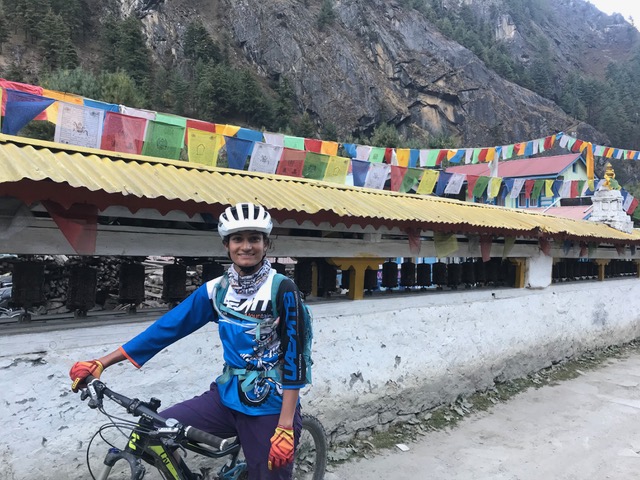 World Ride is committed to the long term vision of helping create opportunity for more Nepali women to begin mountain biking. World Ride photo.
World Ride is committed to the long term vision of helping create opportunity for more Nepali women to begin mountain biking. World Ride photo.
If someone wants to become a mountain bike guide, how does World Ride make that happen?
JC: The training is specific to each country. First aid is definitely a requirement, and there are some certifications you can get, but what makes a difference is hands-on training. English classes are a big thing if the guides need to improve their English skills. One of my goals, though, is to create an instructor training course that’s through BICP or PMBIA to help certified the women, so they can teach skills on top of guiding.
It sounds like World Ride’s approach to empowering women is really multifaceted.
JC: It’s been awesome to meet these women, and it only motivates us to get more women on mountain bikes. That’s one of our biggest challenges: spreading the word.
What made you expand World Ride’s work into Guatemala?
JC: Well, I love to travel—particularly with my mountain bike! I usually do a couple of trips a year for fun, and whenever I go somewhere new I like to get connected with the local mountain biking scene. A friend of mine invited me to Guatemala, and when I was down there I started telling the locals about World Ride and asked them if it could work here too. I got an overwhelmingly positive response, and it’s been cool to see the similarities between Nepal and Guatemala, mostly, how excited the women are to be riding.
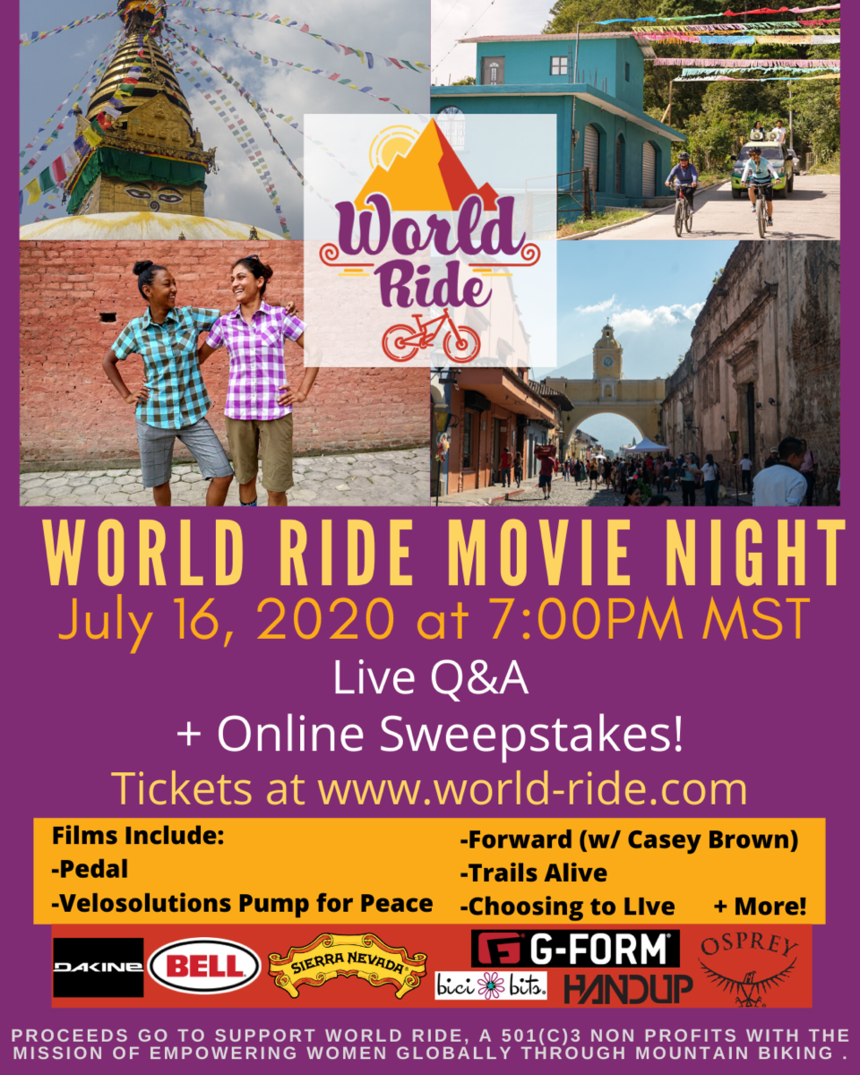
How has COVID-19 impacted your work?
JC: This year we decided to host movie nights as fundraisers. We hosted two—one in Crested Butte and one in Sedona—and then COVID-19 brought everything to a halt. Rather than give up, we pivoted to online movie nights, and it’s been a blessing in disguise. We have a bigger platform, and now more people can attend.
We were also hoping to expand our program into Peru and Lesotho, but COVID-19 is putting that on hold. Hopefully, that comes to fruition in 2021!
How can people support your cause?
JC: The best way is to raise money, so more women can get bikes and we can put them through leadership training. Going on a trip is also a big help. You can even fundraise for your trip to make a bigger impact. For every $1000 you raise, you’ll get $100 off your trip. The movie nights are a good way to help too. Tickets are $10, and the money directly goes to supporting these women.
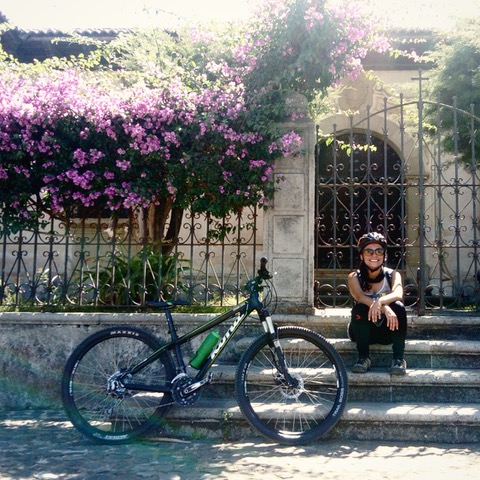 World Ride works with local partners in each location that are committed to our mission. These partners help to recruit more women into the mountain biking community, assist in training guides and also employing certified guides. World Ride photo.
World Ride works with local partners in each location that are committed to our mission. These partners help to recruit more women into the mountain biking community, assist in training guides and also employing certified guides. World Ride photo.
Why do you think bikes are so empowering for these women?
JC: I think it’s cause it’s a challenging sport. Learning your capabilities of what you can do on a mountain bike can translate to other areas of your life. I think that holds true for anyone who loves to ride. If you push through something challenging on your bike, then you can push through other challenges you encounter day to day.



__video_thumb.jpg)
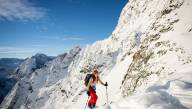


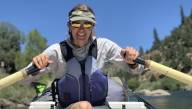

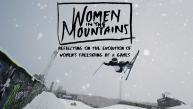
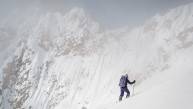


__video_thumb.jpg)
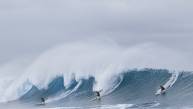
__video_thumb.jpeg)





